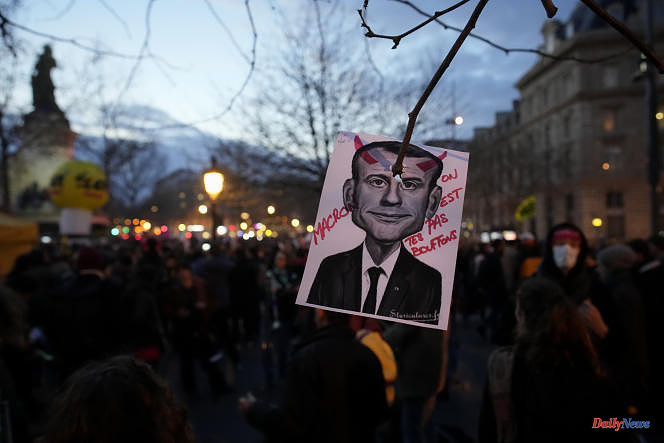Emmanuel Macron has planned to address the French on Wednesday, March 22 at 1 p.m., during an interview broadcast on TF1 and France 2, but the Head of State on Tuesday gave a probable overview of the tone of his about, while the adoption of the pension reform continues to cause mobilizations and points of tension in several cities of the country.
"A period is opening before us where we must appease, calm, return to the field and listen to the anger", declared the president, before the parliamentarians of his camp invited to the Elysée, at the end of a day marked by consultation meetings with the head of government Elisabeth Borne, ministers and leaders of Macronie.
"What I am asking the Prime Minister is to reorganize the work of the government on this basis," he added, calling on the "ministerial cabinets" to work "much more with the parliamentarians of the majority", according to participants in this meeting.
Mr. Macron also justified the use of 49.3 to pass his pension reform without a vote, despite the protests of opponents of the text. "Using the Constitution to pass a reform is always a good thing", because "this reform would not pass if we did not take 49.3", he estimated, tackling those who, in his own camp, wanted a vote but actually "would rather we lose".
"Which hand have we not grasped?" »
While the government resisted, by just nine votes, a motion of no confidence in the National Assembly on Monday, he assured that this vote demonstrated that there was "no alternative majority". "And it's not because it goes to very little that it is illegitimate, on the contrary," he insisted. "Which hand have we not grasped?" I ask, ”said Emmanuel Macron again to defend the consultation carried out by the executive.
Several participants in this meeting assured Agence France-Presse (AFP) that the Head of State had no intention of dissolving the Assembly, reshuffling the government, or calling a referendum on the reform raising the retirement age from 62 to 64. The option of withdrawing the text, demanded by the unions and the opponents, was also ruled out.
"The crowd, whatever it is, has no legitimacy in the face of the people who express themselves sovereign through their elected officials", he then launched, while the demonstrations, enamelled sometimes with tensions, continued Tuesday evening in Paris and elsewhere in France. "The riot does not prevail over the representatives of the people," he added, posing as the guarantor of "the democratic and republican order".
Manifestations et tensions
In fact, the mobilization continues in different forms. In Paris, a tense face-to-face with exchanges of projectile jets and tear gas pitted a few hundred people against the police on the Place de la République, after a union rally which brought together up to to 3,500 demonstrators, according to the police headquarters. Demonstrators also played a game of cat and mouse with the police in the Bastille district. A total of 46 people were arrested, according to a police report given before midnight. Other demonstrations took place in Grenoble, Rennes, Lille or Nantes where incidents, damage and scuffles were recorded, in particular over wild processions.
In addition to the renewable garbage collectors' strike in several cities including Paris, around 12% of service stations in France have run out of petrol or diesel and 6% have run out. Incidents erupted Tuesday in front of the oil depot of Fos-sur-Mer, near Marseille, where the authorities proceeded to the first requisitions of personnel on strike against the reform.
"Nothing undermines the determination of the workers," warned the CGT, before a new day of action on Thursday, at the call of all the unions. Less than forty-eight hours from this new mobilization, the RATP foresees "very disrupted" traffic in the transport of the capital and its inner suburbs. Ditto for trains at the national level, for the SNCF.
CFDT Secretary General Laurent Berger said he was worried about the "anger" and "violence" that could be expressed as a result of the adoption of a law that had "no majority in the vote". 'Assembly ".
According to Interior Minister Gérald Darmanin, "more than 1,200" undeclared, "sometimes violent" demonstrations have taken place across the country since Thursday. He announced that "12,000 police and gendarmes" would be mobilized on Thursday, including "5,000 in Paris", while between 600,000 and 800,000 demonstrators, including 40,000 to 70,000 in Paris are expected by the authorities.












